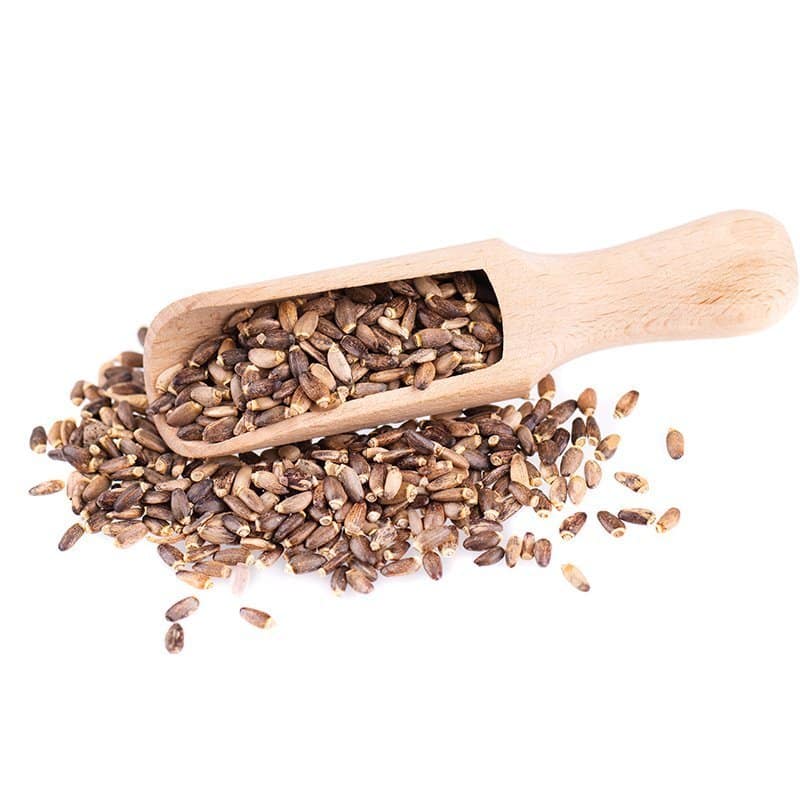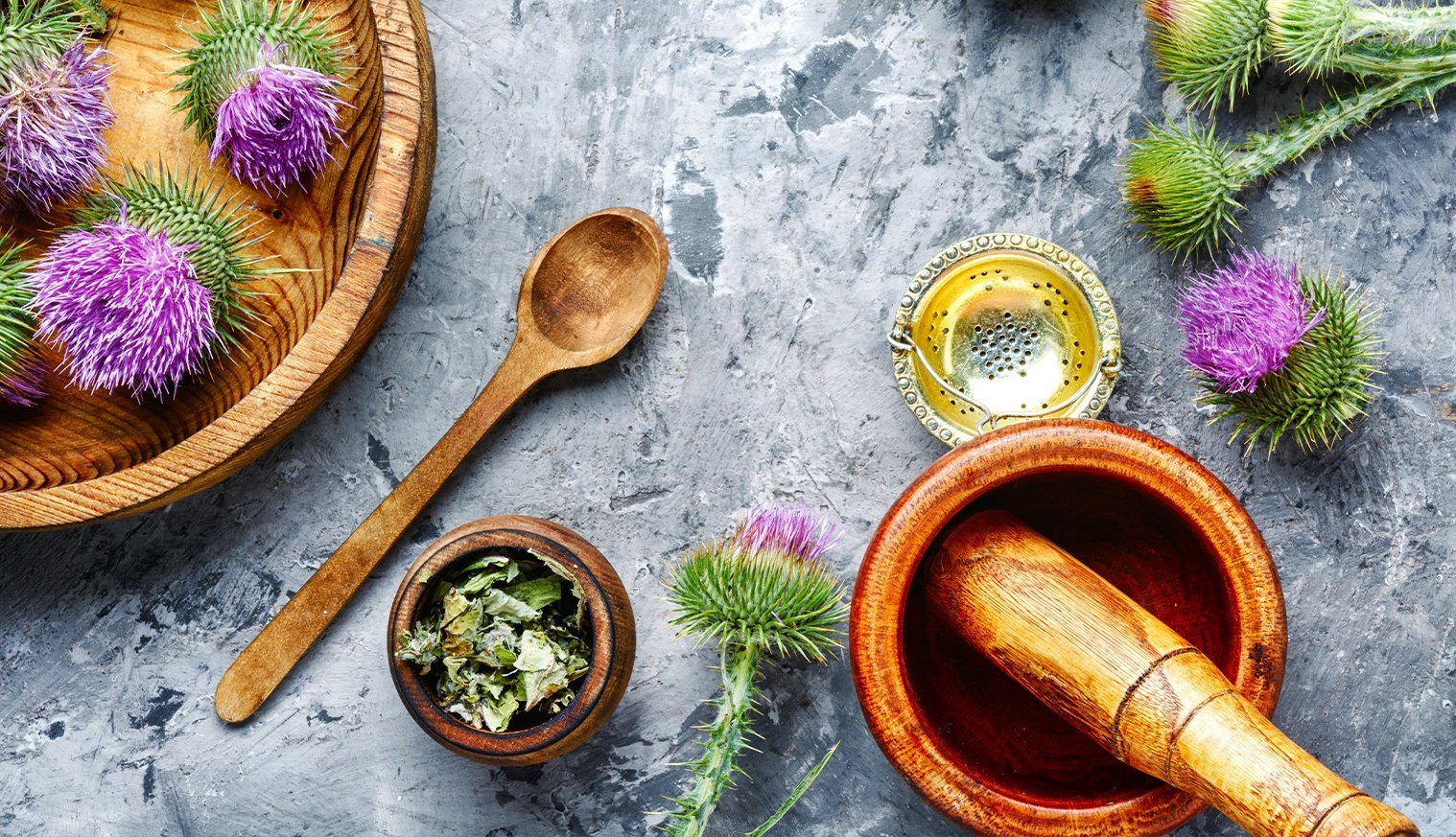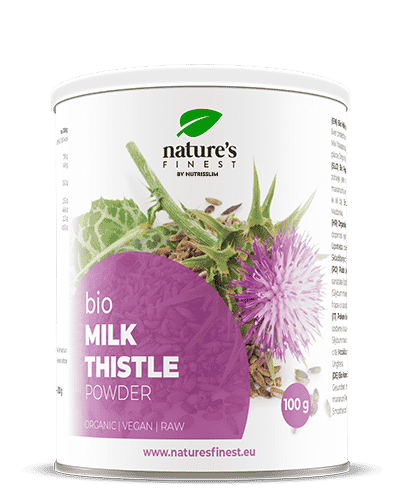The healing properties of milk thistle
The plant, which was used for medicinal purposes in ancient Greece and Rome, known for its detoxifying effects, and therefore absolutely necessary in the fight against fat around the liver. In addition to protecting the liver, it also has the ability to cleanse the body, supports digestion and is an excellent anti-constipation agent.
(A – spotted thistle plant, B – flower, C – dried flower, D – seeds, E – dried and ground seeds)
The liver is one of the most important organs in our body. It performs various functions that are crucial to our health. Among other things, the liver removes harmful substances from the body. Therefore, occasional detoxification of the body is a needed procedure to maintain the well-being.

WHAT IS MILK THISTLE?
Milk thistle (Silybum marianum) is a plant that belongs to the Asteraceae family. Its use goes back a long way in history, when it was used for nutritional and medicinal purposes. It was used by the Greeks to protect the liver, and is still used for this purpose today.
The milk thistle originates from the Mediterranean and is widespread from the Iberian Peninsula to southern Russia, northern Africa and Anatolia. It also grows in South and North America and South Australia. It is sometimes wild in Central Europe. Milk thistle likes sunny, dry and rocky soils, roadsides, screes and pastures.
We use the fruits, which contain three active ingredients, called with one name – silymarin. The action of silymarin has not been fully understood yet. Currently there are 3 methods of action that are being studied:
- first action is stimulating protein synthesis, which causes liver cell’s regeneration
- second effect of silymarin is thought to be preventing toxins from passing through the liver cells
- the third action is its antioxidant activity.
All three actions have a preventive effect on the liver.
THE EFFECTIVNESS of the MILK THISTLE
is widely researched and confirmed in several high-quality clinical trials.
The treatment is effective in various cases:
- liver damage
- virus infections
- green fly poisoning
- alcoholism
- in case of adverse drug reactions,
- in case of poisoning with organic solvents
- in (non) alcoholic liver cirrhosis and some other cases.
A 2011 meta-analysis found that the addition of milk thistle could potentially improve glucose regulation in type 2 diabetes. Its action also reduces cholesterol absorption and lipoprotein biosynthesis, and lowers ALT5 and AST6 serum levels in certain individuals with non-alcoholic fatty liver disease.

How do we recognise liver problems?
Fatty liver causes:
- slower metabolism of carbohydrates and prevents the storage of excess glucose, which means that the body does not receive a new wave of energy when it needs it, which is manifested as constant fatigue and exhaustion
- poor metabolism of fats and carbohydrates, which is reflected in the accumulation of fat around the waist and abdomen
- heartburn,
- excessive sweating and overheated body
- poor and slow digestion accompanied by bloating and occasional nausea
- weaker resistance
- skin problems (itchy skin with acne or dark spots).
USE OF MILK THISTLE
Milk thistle is an effective remedy from the nature. It is mostly used in powder or as seeds, and is ingested through the mouth. Its use is recommended for the symptoms listed above, but we believe that further research will prove milk thistle’s even higher effectiveness.
The ground seeds can be easily eaten with yogurt or mixed into a smoothie. Milk thistle is one of the safest medicinal plants, even with a large overdose there are no side effects, except for digestive disorders and faster digestion.
Literature:
Taken from: Kreft S., 2017. Myths and truths about liver detoxification with medicinal plants and dietary supplements. Pharmaceutical Journal, 68: 69 – 75.
Suksomboon N., 2011. Meta-analysis of the effect of herbal supplement on glycemic control in type 2 diabetes, Journal of Ethnopharmacology, 137:3, 1328 – 1333.
Fogacci F. in sod., 2019. Metabolic effect of berberine-silymarin association: A meta-analysis of randomized, double-blind, placebo-controlled clinical trials. Phytotherapy Resserch, 33;4: 862-870
Avelar R.C. in sod., 2017. Effect of silymarin on biochemical indicators in patient with liver disease: Systematic review with meta-analysis. Worlf Journal of Gastroenterology, 23;27: 5004-5017
ALT = alanine aminotransferase
AST = aspartate aminotransferase

